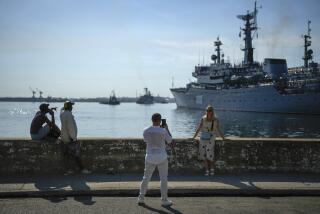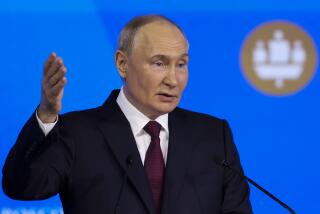Russia bolsters naval presence near Syria, will continue to aid Assad
MOSCOW -- Russia will continue to supply weapons to Syria in the event of a U.S. military strike, President Vladimir Putin said Friday, as three naval ships headed to the eastern Mediterranean to bolster the country’s fleet near the Syrian coast.
“Will we help Syria? Yes, we will,” Putin said in response to a journalist’s question at the conclusion of a Group of 20 summit in St. Petersburg. “We are helping them now. We are supplying weapons, cooperating in the economic sphere.”
President Obama used the meeting of world leaders to press his case for punitive strikes against the government of Syrian President Bashar Assad for a reported Aug. 21 chemical attack on pro-rebel suburbs of Damascus. He met with Putin for about 20 minutes Friday, but failed to persuade the Russian leader, a close Syria ally.
“We both remained unconvinced by each other’s opinion,” Putin said at a news conference. “But there is a dialogue. We hear each other, we understand arguments, but we don’t agree with them.”
On Thursday, Kremlin Chief of Staff Sergei Ivanov said Russia was increasing its naval presence in the eastern Mediterranean in case of a possible evacuation of Russian citizens from Syria. About 8,000 Russian nationals have registered with the country’s diplomatic mission in Syria, although the actual number in the country is believed to be significantly higher.
The three ships en route to the region include two amphibious landing vessels, the Novocherkassk and the Minsk, and the Priazovye reconnaissance ship, the Interfax news agency reported Friday.
Another landing vessel, the Nikolay Filchikov, was headed to the Russian port of Novorossiysk to collect unspecified cargo for Syria, the RIA-Novosti news agency reported. A guided-missile destroyer was also expected to join the fleet in the region, the news agency said.
Meanwhile, Rusian Foreign Ministry spokesman Alexander Lukashevich warned the United States and its allies against striking Syria’s chemical weapons stockpiles, saying that “such actions could pose a new, dangerous twist in the tragic developments of the Syrian crisis.”
“Besides, it can’t be ruled out that as a consequence of such a reckless action, rebels and terrorists could get access to chemical weapons,” Lukashevich said in a statement posted on the ministry’s website.
Russia backs Syria’s contention that the Aug. 21 attack was a “provocation” on the part of rebels seeking international intervention in the country’s 2 1/2-year-old civil war.
Putin suggested Friday that to attack Syria without obtaining U.N. Security Council authorization would put the United States “outside the law.” The Security Council is unlikely to approve such action because Russia and China, another Syria ally, hold veto power.
Obama argued Friday against letting “paralysis” at the United Nations stand in the way of an international response to the reported used of banned chemical weapons.
“If we end up using the U.N. Security Council not as a means of enforcing international norms and international law, but rather as a barrier to acting, then I think people rightly are going to be pretty skeptical about the system,” Obama told reporters in St. Petersburg.
ALSO:
Obama, Putin meet at summit despite tensions over Syria
U.S. draws down diplomatic presence in Lebanon and Turkey
Iran’s Rouhani outmaneuvering hard-liners on Syria, nuclear talks
More to Read
Sign up for Essential California
The most important California stories and recommendations in your inbox every morning.
You may occasionally receive promotional content from the Los Angeles Times.










